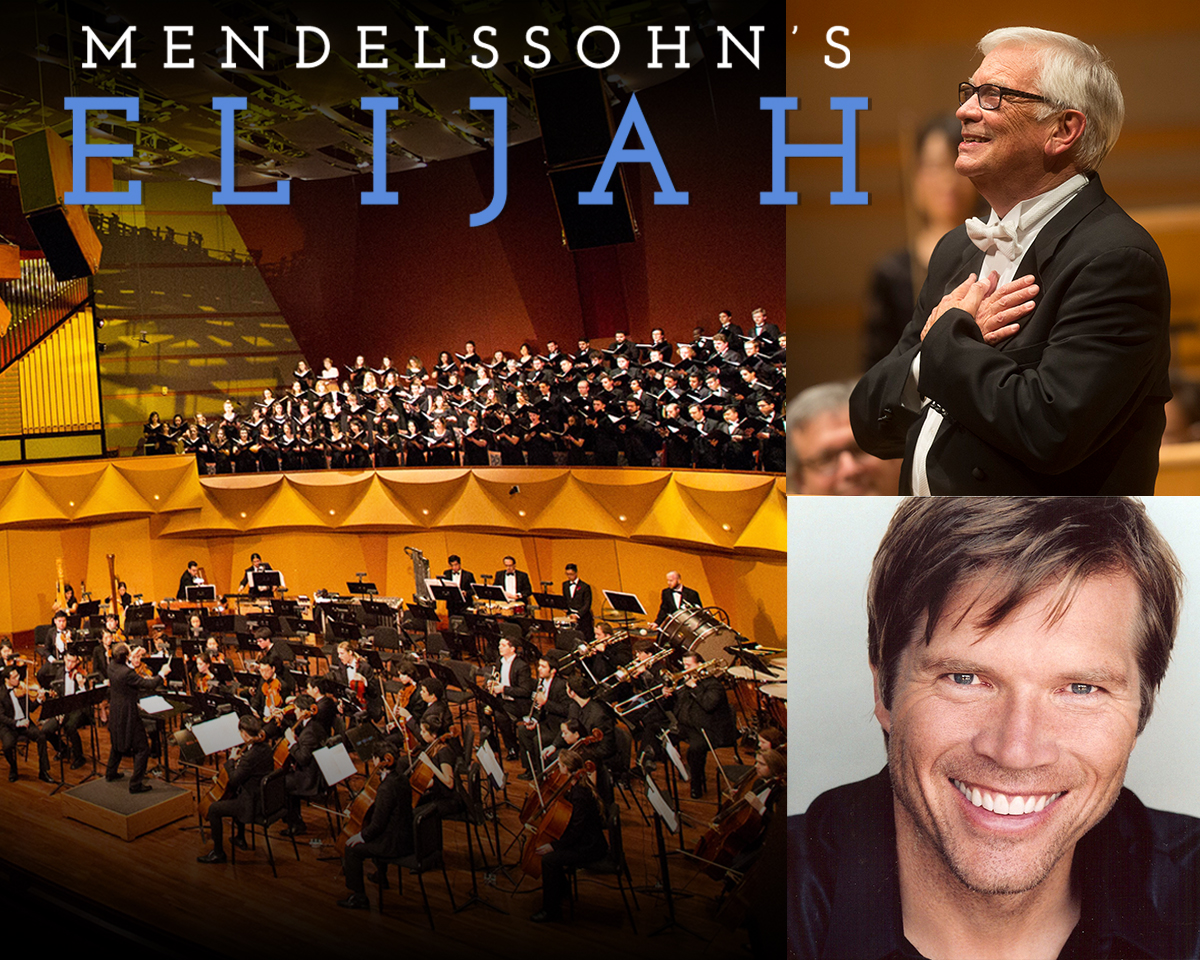
Mendelssohn’s Elijah
Featuring Cal State Fullerton Alumni:
Rod Gilfry, baritone
I-Chin "Betty" Lee, mezzo-soprano
Jason Francisco, tenor
and CSUF School of Music vocal performance major, Katie Martini, soprano
University Symphony Orchestra and Symphonic Chorus
Kimo Furumoto, Robert Istad & Christopher Peterson, directors
John Alexander, conductor
Saturday, May 5, 2018 at 4 pm • Meng Concert Hall
Tickets: $10 / $8 Titan Discount![]()
Orchestra section is almost sold out. Balcony seating will open on Wednesday, May 2nd.
Professor and Pacific Chorale artistic director emeritus John Alexander makes his triumphant return to the stage in this exhilarating and affecting performance featuring Rod Gilfry singing the title role, with the University Symphony Orchestra and Symphonic Chorus.
Attention Alumni:
If you are a Cal State Fullerton School of Music alum, we would like to offer you two
complimentary tickets to this performance! To take advantage of this offer,
please email
with your full name, year of graduation, degree, emphasis and the number of tickets (1 or 2) you would like.
Your ticket(s) will be placed at will call and a confirmation email will be sent.
– RSVP by April 30, 2018 –
Alumni reception to follow!
Elijah soloists
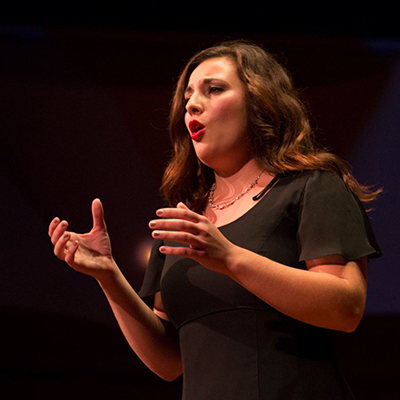
Katie Martini, Soprano
B.M. (Music)
anticipated in May 2019
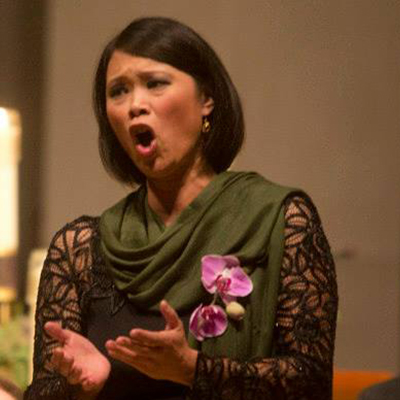
I-Chin "Betty" Lee, Mezzo Soprano
'06 (B.M. Music)
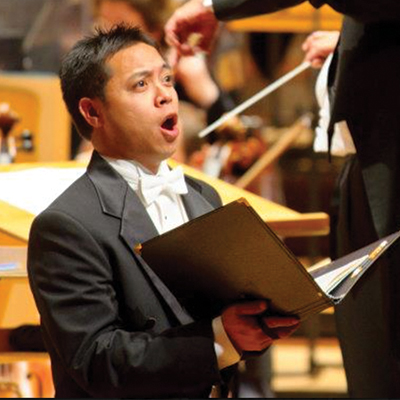
Jason Francisco, Tenor
'02 (B.M. Music)
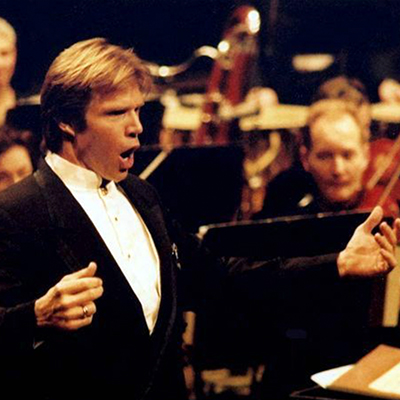
Rod Gilfry, Baritone
'81 (B.A. Music)
John Alexander biography
John Alexander is one of America’s most respected choral conductors. His inspired leadership both on the podium and as an advocate for the advancement of the choral art has garnered national and international admiration and acclaim.
Alexander’s long and distinguished conducting career has encompassed hundreds of choral and orchestral performances nationally and in 27 countries around the globe. He has conducted his singers with orchestras throughout Europe, Asia, the former Soviet Union and South America and, within his own Southern California community, with Pacific Symphony, Pasadena Symphony, Musica Angelica and the Los Angeles Chamber Orchestra. Alexander is equally proficient behind the scenes, having prepared choruses for many of the world’s most outstanding orchestral conductors, including Zubin Mehta, Pierre Boulez, Seiji Ozawa, Michael Tilson Thomas, Leonard Slatkin, Esa-Pekka Salonen, Gustavo Dudamel, Lukas Foss, Max Rudolf, Carl St.Clair, Gerard Schwarz, Marin Alsop, John Mauceri, John Williams, and Keith Lockhart.
Alexander is the Artistic Director Emeritus of Pacific Chorale, having served as Artistic Director and Conductor from 1972 to 2017. Under his direction, the organization grew to become one of the foremost symphonic choirs in the nation, enjoying thirteen international tours throughout Europe, Asia, and South America; establishing productive artistic partnerships with Pacific Symphony and Segerstrom Center for the Arts; performing dozens of world and United States premieres; and releasing numerous recordings.
Alexander is nationally recognized for his leadership in the musical and organizational development of the performing arts. He is a board member and former president of Chorus America, the service organization for choruses in North America. Alexander also has served on artistic review panels for national, statewide and local arts organizations, including the National Endowment for the Arts, the California Arts Council, and the Los Angeles County Arts Commission.
Alexander holds the title of Professor Emeritus at California State University, Fullerton, where he taught as Director of Choral Studies from 1996 to 2006. From 1970 to 1996, he held the same position at California State University, Northridge. Today Alexander continues his involvement in the pre-professional training of choral conductors. He is in demand as a teacher, clinician, and adjudicator in festivals, seminars, and workshops across the United States. In 2003, Chorus America honored him with the establishment of the “John Alexander Conducting Faculty Chair” for their national conducting workshops.
A proponent of contemporary American music, Alexander is noted for the strong representation of American works and composers in his programming. He has conducted many premieres of works by composers such as Jake Heggie, Morten Lauridsen, Eric Whitacre, Frank Ticheli, and James Hopkins. Alexander is also a composer of many works and serves as the editor of the John Alexander Choral Series with Hinshaw Music, as well as the John Alexander Singers Choral Series with Pavane Publishing.
His numerous tributes and awards include a Lifetime Achievement Award from the ACDA, Western Division (2016); the “Michael Korn Founders Award for Development of the Professional Choral Art” from Chorus America (2008); The “Distinguished Faculty Member” award from California State University, Fullerton (2006); the Helena Modjeska Cultural Legacy Award (2003), presented in honor of his lifetime achievement as an artistic visionary in the development of the arts in Orange County; the “Outstanding Individual Artist” Award (2000) from Arts Orange County; the “Gershwin Award” (1990), presented by the county of Los Angeles in recognition of his cultural leadership in that city; and the “Outstanding Professor” Award (1976) from California State University, Northridge.
Rod Gilfry biography
Rod Gilfry was born and raised in Southern California. He earned degrees from California State University Fullerton, and the University of Southern California. From 1987 to 1989 he was a member of the Frankfurt Opera ensemble, and from 1989 to 1994 he was a member of the Zurich Opera ensemble.
The two-time Grammy nominee, singer and actor has performed in all the world's music capitals. He is acclaimed world-wide in opera, musicals, recitals and cabaret. He has created 12 leading roles in opera world premieres, most recently in the Brooklyn Academy of Music solo opera by David Lang, the loser; and at the Houston Grand Opera in Jake Heggie's It's a Wonderful Life.
Other recent appearances include: Adelaide Festival (Brett Dean's Hamlet), Glyndebourne Festival (Hamlet world premiere), Metropolitan Opera (Thomas Adès The Exterminating Angel), Brooklyn Academy of Music (Matthew Aucoin's Crossing), Los Angeles Master Chorale (Beethoven Missa Solemnis), Edinburgh Festival (Mozart's Così fan Tutte), American Repertory Theater Boston (Matthew Aucoin's Crossing world premiere), Zurich Opera (Christian Jost's Rote Laterne world premiere), NYC Mostly Mozart Festival (Mozart's Così fan Tutte), San Francisco Symphony (The Tempest), Alabama Symphony (Beethoven 9th Symphony), New York City Opera (Mark-Anthony Turnage's Anna Nicole), Aix-en-Provence Festival (Mozart's Don Giovanni, Così fan Tutte), Quebec City Festival (Thomas Adès The Tempest), Los Angeles Philharmonic (Mozart's Così fan Tutte), London Royal Opera Covent Garden (Mark-Anthony Turnage's Anna Nicole), Metropolitan Opera (Franz Lehár's The Merry Widow), Milwaukee Symphony (Mozart's Così fan Tutte).
Recent recordings include Mozart's Così fan Tutte, Jake Heggie's It's a Wonderful Life, "Great Voices Sing John Denver", Sasha Matson's Cooperstown, Steven Stucky's August 4th, 1964.Upcoming appearances include San Bernardino Symphony solo concert, Phoenix Symphony (Brahms Ein deutsches Requiem), CSU Fullerton (Mendelssohn's Elijah), Los Angeles Opera (Matthew Aucoin's Crossing, David Lang's the loser), Santa Fe Opera (Richard Strauss' Ariadne auf Naxos, Mozart's Così fan Tutte), Seoul (Mozart's Così fan Tutte), San Francisco Opera (Jake Heggie's It's a Wonderful Life), Metropolitan Opera (Jake Heggie's Dead Man Walking).
Rod Gilfry is an Associate Professor of Vocal Arts at the University of Southern California Thornton School of Music in Los Angeles.
Katie Martini biography
Currently finishing her studies in vocal performance with Professor Patricia Prunty in the School of Music at California State University, Fullerton, soprano Katie Martini is a classically trained vocalist with a passion for collaborative music making.
As a member of the CSUF University Singers under the direction of Dr. Robert Istad, Katie In their 2012 tour to New York, she performed as a soloist on Tarik O’regan’s The Ecstasies Above at Carnegie Hall. Katie is also a featured soloist on the University Singers' recording "Nostos: The Homecoming of Music" produced by Yarlung Records.
Katie also performs in the opera productions at CSUF. She has performed La Princesse in Maurice Ravel’s L’enfent et les Sortilèges, Alice Ford in Otto Nicolai’s The Merry Wives of Windsor, and soon Fiordiligi Mozart’s Così fan Tutte.
Some of Katie’s most recent achievements include receiving the CSUF music faculty nominated "Theodore Presser Scholarship Award", as well as winning first place in the voice division of the 2016 CSUF Music Associates Concerto and Aria Competition.
I-Chin "Betty" Lee biography
Mezzo-soprano I-Chin “Betty” Lee currently sings professionally with Pacific Chorale, the John Alexander Singers, and is the cantor at St. Paul’s Cathedral Center in Echo Park. Ms. Lee has performed as a chorister and soloist with Pacific Chorale on numerous occasions including Bach’s Mass in B minor, Handel’s Messiah, Beethoven’s 9th Symphony and Bach’s St. John Passion. She has also appeared as soloist in Mozart’s Requiem, Phillip Glass' The Passion of Ramakrishna, Rachmaninoff’s Vespers, Duruflé’s Requiem, Handel’s Judas Maccabaues, and Mendelssohn’s Elijah, which was praised by Timothy Mangan of Orange County Register as, “delicate and aristocratic singing in her solos”.
Jason Francisco biography
Tenor Jason Francisco sings professionally with Los Angeles Opera and San Diego Opera. He has also soloed with Pacific Chorale, the John Alexander Singers, Pacific Symphony Orchestra and the Corona Del Mar Baroque Orchestra.
Jason has appeared and/or toured with the Los Angeles Philharmonic under Gustavo Dudamel, the Hollywood Bowl Orchestra under John Mauceri and John Williams, the Boston Pops Orchestra under Keith Lockhart, Musica Angelica under Martin Haselbock, the Munich Symphony under Ludwig Wicki, and Andrea Bocelli. Jason is also featured as vocal soloist in Roger Bellon’s soundtrack of the film 186 Dollars to Freedom.
Mendelssohn’s "Elijah" - Program notes by Dr. Gordon Paine
The nineteenth-century industrial revolution created in England a middle class that embraced singing as a leisure activity. As choral associations and festivals sprang up they needed literature, which they obtained largely from the works of Purcell and Handel until Haydn’s The Creation appeared in print in 1800. Two generations later, another Teutonic composer joined the Handel-Haydn oratorio pantheon: Felix Mendelssohn.
A prodigy of Mozartean caliber, by age ten Mendelssohn mastered the piano, violin, and organ and was cutting his teeth as a composer. At twelve he was literate in French and Latin, was writing poetry, and had composed dozens of keyboard, chamber, and choral works. By his mid twenties he had become one of the premier composers and conductors in Europe.
His brilliance was a product of nature and nurture in auspicious proportion. His grandfather, Moses, was the most eminent Jewish philosopher of the Enlightenment, and his father, Abraham, founded a banking house that survived until the Third Reich. The wealth and contacts of Abraham and his wife, Lea, a pianist, permitted them to provide their children with both education and opportunity. Felix was not the only precocious child in the household: His elder sister Fanny, who served as her brother’s lifelong muse and critic, was a fine composer and pianist in the own right.
The one disadvantage the Mendelssohns faced was being Jews in a culture with an anti-Semitic history. Owing to the prominence of Felix’s maternal great grandfather and paternal grandfather, the family possessed rare letters of protection from the crown that granted them “all the rights of Christian citizens” within Prussia. Even this, however, did not seem sufficient insurance to the Mendelssohn parents, who in 1816 baptized their four children as Protestants. The composer’s Christian upbringing and Jewish heritage were to be of significance in the subjects he chose for his two oratorios: St. Paul concerned the Christian conversion of another Jew, while Elijah (1846) dealt with an Old Testament prophet.
St. Paul met with spectacular success at the Rhine Music Festival in Düsseldorf, and shortly after it premiere there on May 22, 1836, Mendelssohn was inspired to write a second oratorio, on the subject of the ninth-century B.C. prophet Elijah, whom Jehovah charged to bring the disloyal Israelites back to him. Before anything else, the project needed a libretto, but Mendelssohn’s preferred librettist dawdled so long that the composer abandoned him and turned instead to a minister named Julius Schubring, the librettist for St. Paul, who doubtless felt slighted to be second choice.
Conflict soon surfaced. While Schubring envisioned a work of religious piety, Mendelssohn insisted on a real drama: “I imagined Elijah as a grand, mighty prophet, of the kind we might require in our own day, energetic and zealous, but also stern, angry, brooding, in striking contrast to the rabble you find both in court and in the populace—indeed, up against the whole world—yet borne aloft on angels’ wings . . . . The personages should act and speak as if they were living beings.” The disagreement unresolved, Schubring soon quit, and Elijah went onto the back burner, where it rested for seven years.
In June, 1845 Elijah sprang back to life when the Birmingham Festival commissioned a Mendelssohn oratorio for its 1846 festival. This time it was the composer who procrastinated. On December 16, just over eight months before the scheduled premiere, he approached Schubring once again, sending him a libretto of his own for the first part of the oratorio, for which he sought criticism and suggestions.
In late May, Mendelssohn wrote to his collaborator, “I have now quite finished the first part, and six or eight numbers of the second are already written down. In various places in the second part, however, I require a choice of really fine Scriptural passages, and I do beg of you to send them to me!”
With just three months remaining, and the composer committed to a half dozen conducting engagements in three countries, most of the second part of Elijah—which still had no libretto—still begged to be composed. Only after completion could the complete work be translated into English, engraved, printed, corrected, and rehearsed. In an age of sailing ships and quill pens, with the composer in Germany and the translator in England, the challenge seemed insurmountable. The last-minute pressure was so great that the translator himself had to write out the singers’ parts by hand. Mendelssohn did indeed meet his deadline—but he paid for it with his health, which was never to be the same.
On August 26, 1846 a huge ensemble of 271 choristers and 125 instrumentalists, directed by the composer, presented the first Elijah, after which the exuberant audience demanded eight encores. Performances thereafter revealed to Mendelssohn a number of weaknesses, large and small, and over the following months, despite exhaustion, he embarked on a detailed revision, resulting in the oratorio as we now know it.
Fanny Hensel, Felix’s beloved sister, died on May 14, 1847 of a stroke at age 41. Felix himself succumbed, likewise of a stroke, just six months later, at the age of 38, having outlived Mozart by just two years, ten months, and 24 days. Since that time, composers and oratorios have come and gone, but none save Handel’s Messiah has matched or exceeded Elijah in lasting popularity on both sides of the Atlantic.
The Story of Elijah - by Dr. Gordon Paine
The drama unfolds entirely through the words of the characters themselves; there is no narrator. Each of the soloists save Elijah takes on two or more roles, and the chorus plays the part of the people of Israel, the priests of the Phoenician god Baal, and angels.
Mendelssohn's plea to Schubring for "really fine Scriptural passages" must have succeeded, for the libretto sounds as if it were entirely Biblical quotation. And in great part it is, with passages from I and II Kings, Jeremiah, Lamentations, Psalms, Hosea, Isaiah, and Matthew.
Elijah follows the Biblical order of events, although Mendelssohn freely uprooted and transplanted text to wherever it best served his dramatic needs. Instead of trying to tell the complete legend of the prophet, he chose to depict eight dramatic scenes, all but one of which climaxes with a Handelian-style chorus.
Part 1, Scene 1. CRISIS: The people of Israel wither in famine on a rain-starved earth. Elijah begins not with the expected overture, but with four ominous chords that throughout the oratorio announce the words of God. Elijah places a curse on Israel, which has broken its covenant with Jehovah and taken up other gods: For three years Jehovah will provide no rain. The overture then depicts desperation that builds to a choral cry of "Help, Lord!," which melts into a fugal lament.
Scene 2. ESCAPE: Elijah flees persecution and finds miraculous redemption. Elijah withdraws to the desert to meditate, where an angel sends him to stay with a starving widow whose son is dying. Jehovah multiplies her food supply and Elijah resurrects her son, establishing his credibility as a prophet.
Scene 3. DEFIANCE: Elijah confronts King Ahab and clashes with the prophets of Baal. Elijah challenges King Ahab to a duel of the gods. Four hundred fifty priests wail at Baal for six hours with silence as their only answer. But "The fire descends from heaven" when Elijah prays, the people of Israel fall prostrate, and Elijah orders the priests of Baal slain. Elijah concludes the scene with the mighty "hammer" aria, likening the Word of God to hammer and fire.
Scene 4. RELIEF: The rains return and quench the dry earth. Three rainless years have passed. Elijah goes up to Mt. Carmel with a young servant and entreats God to redeem his promise. Six times Elijah asks the boy to look for signs of rain, but he sees nothing. The seventh time clouds appear, and the heavens deliver a lifesaving downpour. A spirited chorus, "Thanks Be to God," closes the first part.
Part 2, Scene 1. INSPIRATION: Elijah gives the people of Israel hope. It is Elijah's fate to be spurned by the Israelites, and the first two movements prepare his spirit for the coming ordeal.
Scene 2. VENGEANCE: King Ahab and Queen Jezebel lash out at Elijah with hateful malice. Elijah reproaches King Ahab and prophesies Jehovah's wrath. Queen Jezebel plots against the prophet, stirring dissention among the people, who turn against Elijah (the chorus "Woe to Him!") and force him to flee for his life.
Scene 3. FUGITIVE: Elijah escapes to the wilderness to save his life. Elijah collapses in the desert, and feeling abandoned, prays to die (the luminous aria "It Is Enough"), whereupon a trio of seraphim refresh his spirit ("Lift Thine Eyes"). The scene closes as the chorus assures Elijah that God remains beside him just as a shepherd guards his flock ("He Watching over Israel").
Scene
4. FIRE: Elijah journeys to the Mount of God, where he ascends to heaven in a fiery chariot. An angel commands the prophet to ascend Mt. Horeb, the sacred mountain where Moses received the Ten Commandments. There he endures storm, earthquake, and fire, and is permitted a vision of God-not in these mighty events, but in a "still, small voice." The eight-part chorus of angels sings a splendid "Holy, holy, holy is the Lord, God of Hosts," and leaving behind him seven thousand followers of Jehovah to carry on the struggle, Elijah is borne to heaven in a blazing chariot. The concluding four numbers meditate on the story just told, climaxing with the chorus "Then Shall Your Light Break forth."
